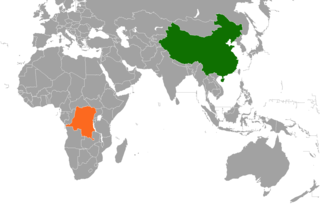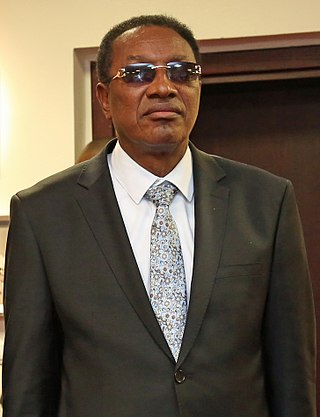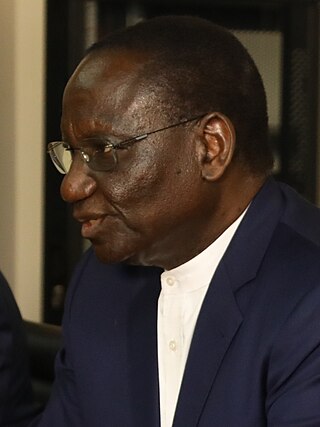The earliest known human settlements in what is now the Democratic Republic of the Congo have been dated back to the Middle Stone Age, approximately 90,000 years ago. The first real states, such as the Kongo, the Lunda, the Luba and Kuba, appeared south of the equatorial forest on the savannah from the 14th century onwards.

Politics of the Democratic Republic of Congo take place in a framework of a republic in transition from a civil war to a semi-presidential republic.

Laurent-Désiré Kabila usually known as Laurent Kabila, was a Congolese rebel and politician who served as the third President of the Democratic Republic of the Congo from 1997 until his assassination in 2001.

The Democratic Republic of the Congo, also known as Congo-Kinshasa, Congo-Zaire, Congo DR, DR Congo, DRC, or simply either Congo or the Congo, is a country in Central Africa. By land area, the DRC is the second-largest country in Africa and the 11th-largest in the world. With a population of around 105 million, the Democratic Republic of the Congo is the most populous Francophone country. The national capital and largest city is Kinshasa, which is also the economic center. The country is bordered by the Republic of the Congo, Central African Republic, South Sudan, Uganda, Rwanda, Burundi, Tanzania, Zambia, Angola, the Cabinda exclave of Angola, and the South Atlantic Ocean.

Joseph Kabila Kabange is a Congolese politician who served as President of the Democratic Republic of the Congo between January 2001 and January 2019. He took office ten days after the assassination of his father, President Laurent-Désiré Kabila in the context of the Second Congo War. He was allowed to remain in power after the 2003 Pretoria Accord ended the war as the president of the country's new transitional government. He was elected as president in 2006 and re-elected in 2011 for a second term. Since stepping down after the 2018 election, Kabila, as a former president, serves as a senator for life.

The Second Congo War, also known as Africa's World War, the Great War of Africa, or the Great African War, began in the Democratic Republic of the Congo on 2 August 1998, little more than a year after the First Congo War, and involved some of the same issues.

Étienne Tshisekedi wa Mulumba was a Congolese politician and the leader of the Union for Democracy and Social Progress (UDPS), formerly the main opposition political party in the Democratic Republic of the Congo (DRC). A long-time opposition leader, he served as Prime Minister of the country on three brief occasions: in 1991, 1992–1993, and 1997. He was also the father of the current President, Felix Tshisekedi.

Jean-Pierre Bemba Gombo is a politician in the Democratic Republic of the Congo (DRC). He has served as Deputy Prime Minister of Defense since 2023. He was previously one of four vice-presidents in the transitional government of the Democratic Republic of the Congo from 17 July 2003 to December 2006. He led the Movement for the Liberation of the Congo (MLC), a rebel group turned political party. He received the second-highest number of votes in the 2006 presidential election. In January 2007, he was elected to the Senate.

Corruption in the Democratic Republic of the Congo, which used to be an institutionalized part of the state, has been relatively lowered in recent years. However, it continues to exceed corruption in comparison to most states. The BBC's DRC country profile calls its recent history "one of civil war and corruption." President Joseph Kabila established the Commission of Repression of Economic Crimes upon his ascension to power in 2001.

Belgium–Congo relations refers to relations between the Kingdom of Belgium and the Democratic Republic of the Congo. The relationship started with the exploration of the Congo River by Henry Morton Stanley.

Emmanuel Dungia was a diplomat of the Democratic Republic of Congo (DRC) and author of the political book: Mobutu and the money of Zaïre: the revelations of a diplomat, former Secret Services agent. The latter includes the report prepared for the International Monetary Fund by Erwin Blumenthal, former Director of Foreign Affairs of the Bundesbank. Dungia was also imprisoned but was eventually acquitted by the Congolese government for his alleged involvement in a plot to overthrow Laurent Kabila who was assassinated 16 January 2001.

The People's Republic of China (PRC) and the Democratic Republic of the Congo (DRC) have maintained diplomatic relations since 1961 and contacts between the two regions stretch back to 1887 when representatives of the Congo Free State established contacts with the court of the Qing dynasty. The first treaty between the two powers was signed in 1898.
The following lists events that happened during 1998 in the Democratic Republic of the Congo.

General elections were held in the Democratic Republic of the Congo on 30 December 2018, to determine a successor to President Joseph Kabila, as well as for the 500 seats of the National Assembly and the 715 elected seats of the 26 provincial assemblies. Félix Tshisekedi (UDPS) won with 38.6% of the vote, defeating another opposition candidate, Martin Fayulu, and Emmanuel Ramazani Shadary, backed by the ruling party PPRD. Fayulu alleged that the vote was rigged against him in a deal made by Tshisekedi and outgoing President Kabila, challenging the result in the DRC's Constitutional Court. Different election observers, including those from the country's Roman Catholic Church, also cast doubt on the official result. Nonetheless on 20 January the Court rejected his appeal and declared Tshisekedi as the winner. Parties supporting President Kabila won the majority of seats in the National Assembly. Félix Tshisekedi was sworn in as the 5th President of the Democratic Republic of the Congo on 24 January 2019, making it the first peaceful transition of power in the country since it became independent from Belgium in 1960.

On 20 December 2016 the Democratic Republic of the Congo's president, Joseph Kabila, announced that he would not leave office despite the end of his constitutional term. Protests subsequently broke out across the country, which had never had a peaceful transfer of power since it gained independence in 1960. The protests were met with the government's blocking of social media, and violence from security forces which left dozens dead. Foreign governments condemned the attacks against protesters.

Bruno Tshibala Nzenze is a Congolese politician who served as Prime Minister of the Democratic Republic of the Congo from 2017–2019.

Félix Antoine Tshisekedi Tshilombo is a Congolese politician who has been the President of the Democratic Republic of the Congo since 24 January 2019. He is the leader of the Union for Democracy and Social Progress (UDPS), the DRC's oldest and largest party, succeeding his late father Étienne Tshisekedi in that role, a three-time Prime Minister of Zaire and opposition leader during the reign of Mobutu Sese Seko. Tshisekedi was the UDPS party's candidate for president in the December 2018 general election, which he was awarded, despite accusations of irregularities from several election monitoring organisations and other opposition parties. The Constitutional Court of the DRC upheld his victory after another opposition politician, Martin Fayulu, challenged the result, but Tshisekedi has been accused of making a deal with his predecessor, Joseph Kabila. The election marked the first peaceful transition of power since the state became independent from Belgium in 1960.

Sylvestre Ilunga Ilunkamba is a Congolese politician who was appointed as the Prime Minister of the Democratic Republic of the Congo in May 2019, formally establishing his government in August 2019. He has had a long political career going back to the 1970s, having held a number of ministerial cabinet posts, and was previously a professor at the University of Kinshasa since 1979. Ilunga has also been the secretary general of Congo's national railway company. He has a reputation as an experienced public servant and technocrat, as well as an ally of former President Joseph Kabila.
Solange Kwale Dangba, sometimes referred to by the nickname Ya Kwale, is a journalist and politician in the Democratic Republic of the Congo.
Marcel Malenso Ndodila is a Congolese politician. On 5 February 2007, he was appointed as the Minister of Culture and the Arts of the Democratic Republic of the Congo, under Antoine Gizenga Government that ran from 25 November 2007 under the leadership of Prime Minister Antoine Gizenga. He is a member of Unified Lumumbist Party (ULP).















